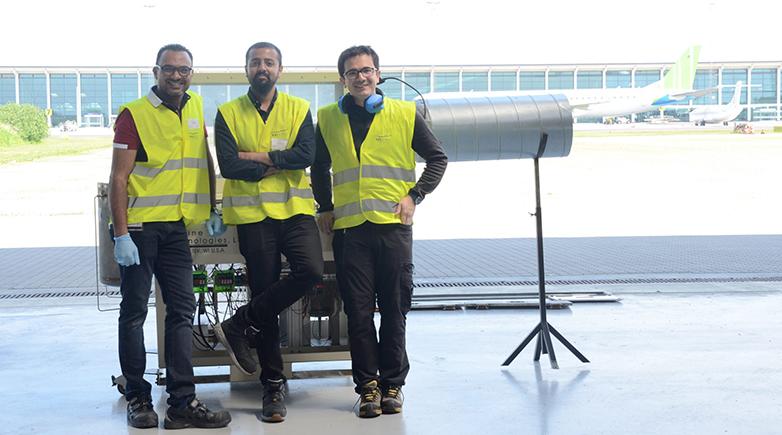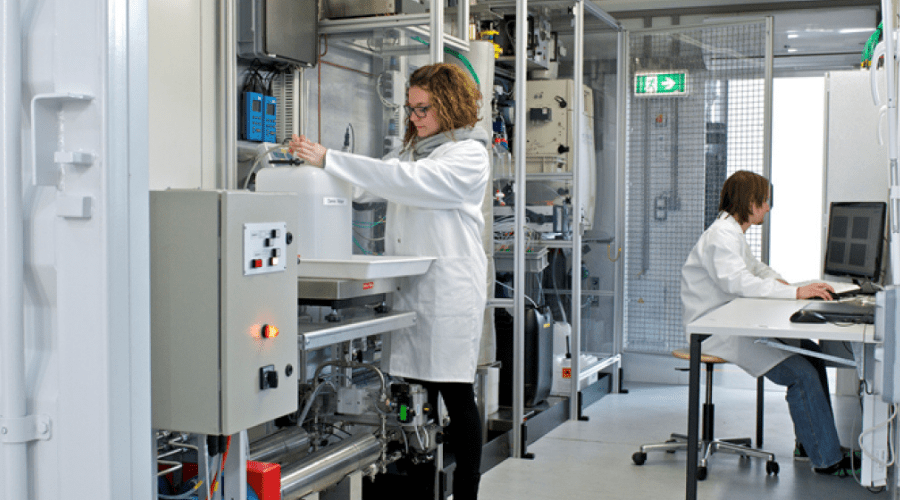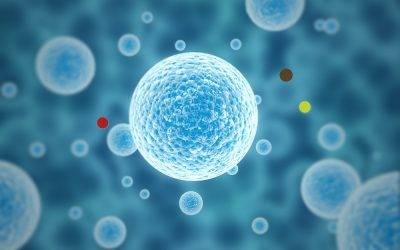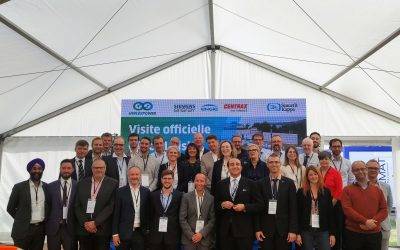Advanced biofuel breakthrough: HyFlexFuel converted sewage sludge into kerosene
The EU funded research project HyFlexFuel recently succeeded to produce biocrudes via hydrothermal liquefaction (HTL) from a variety of biomasses, including sewage sludge, food waste, manure, wheat straw, corn stover, pine sawdust, miscanthus and microalgae in a pilot-scale continuous HTL plant at Aarhus University (Denmark). ”It has been a real milestone in HyFlexFuel to demonstrate biocrude production from such a variety of feedstocks in the hundreds of kg’s scale”, says Patrick Biller, who leads the pilot-scale HTL research at Aarhus University. Biocrudes from three representative feedstocks, Spirulina (micro-algae), sewage sludge, and wheat straw, were further upgraded to a mixture of hydrocarbon fuels at Aalborg University (Denmark). “Thanks to the expertise of several project partners, HyFlexFuel proved that HTL biocrudes can be successfully upgraded to drop-in fuels in an industrially-relevant environment, achieving hundreds of hours of continuous operations”, adds Daniele Castello of Aalborg University. Analyses of the kerosene fractions of the upgraded biocrude show promising compositions for a use as aviation fuel. “The production of HTL fuels from three different feedstock classes shows the flexibility of the process,” says project coordinator Valentin Batteiger of Bauhaus Luftfahrt (Germany), “Meeting jet fuel specifications is an appropriate target to validate that high-performance transportation fuels can indeed be produced from a broad range of residue and waste streams via hydrothermal liquefaction.”
HTL as key-enabler for sustainable biofuel production
The decarbonization of the transportation sector will require large volumes of renewable fuels. So far, renewable diesel and jet fuels are mainly derived from plant oils, but the EU Renewable Energy Directive limits the use of biofuel from food and feed crops since they do not meet sustainability requirements when produced at large scale. For the future, it will be important to commercialize advanced biofuel conversion technologies, which utilize a broader and more sustainable feedstock base.
The HTL process
Hydrothermal liquefaction (HTL) is an upcoming biofuel technology to produce transportation fuels from a broad variety of bio-wastes and other biomasses.
HTL has several key-advantages, of which the most important are:
- Flexible production potential: The HTL conversion technology taps into a huge global bio-resource with local variety of primary biomasses. The technology is compatible with a broad variety of organic wastes and residues, lignocellulosic energy crops or aquatic biomasses and can adapt to specific regional feedstock availabilities.
- Cost-effectiveness: It can produce advanced biofuels, from marine fuels to kerosene, potentially at lower cost than most competing renewable fuel pathways.
- Sustainability: The HTL technology has the potential to produce fuels with a low carbon footprint over the entire life cycle, without competing with food and feed production. It has the potential to recycle waste streams and thereby contribute to a more circular economy.
The pilot-scale HTL plant processes aqueous biomass slurries (~20% dry matter content) at temperatures up to 350°C and pressures around 200 bar, where water does not boil but remains in a liquid state. Under these conditions, biomass is converted into a crude bio-oil, which is separated from the process water behind the reactor. In a second step, the HTL biocrude is upgraded to transportation fuel products via catalytic treatment with hydrogen at high temperature and pressure (hydrotreating). Thereby, oxygen and nitrogen are removed from the biocrude, which is in turn converted into a mixture of hydrocarbons. Distillation of the upgraded HTL biocrudes yields drop-in capable fuels in the gasoline, kerosene and diesel range.
Laboratory demonstration of key process steps by European consortium
Within the EU-project HyFlexFuel all key steps along a HTL fuel production chain are investigated at the premises of several European research institutions and companies. The potential availability of residues and waste streams across Europe is analysed by DBFZ, the German institute for biomass research, using a geospatial approach. Aarhus University further develops and optimizes HTL conversion at lab-scale and transfers the results to a pilot-scale continuous HTL plant, which also produced all samples for the downstream processes. Aalborg University, supported by Haldor Topsøe (Denmark), implemented the upgrading of various biocrudes to transportation fuels via catalytic hydrotreatment, while Eni (Italy) investigated the perspective of co-processing HTL biocrudes in conventional crude oil refineries.
Solid particles and process waters, which also evolve during HTL conversion, contain a significant fraction of the carbon and the nutrients from the initial biomass. Two options to produce biogas from the organics in these process waters are investigated by Paul Scherrer Institute (Switzerland), via catalytic hydrothermal gasification on their Energy System Integration Platform, and by OWS (Belgium), via anaerobic digestion. The recovery of phosphorus is particularly important for the HTL of sewage sludge in order to close nutrient cycles. University of Hohenheim (Germany) has demonstrated the precipitation of struvite, a fertilizer product, from HTL solids and process waters. Bauhaus Luftfahrt coordinates the project and analyses the economic and environmental impact of HTL fuel production. ARTTIC Innovation GmbH (Germany) serves as a project management partner and supports dissemination activities.
Towards an approval of HTL kerosene for civil aviation
So far, seven alternative fuel production pathways have been approved as a blend component for civil aviation by the ASTM D-7566 specification1. The HyFlexFuel consortium prepares the approval of HTL kerosenes in collaboration with key partners in Europe and the US. Kerosene samples from the HyFlexFuel project were analysed by the H2020 project JETSCREEN (coordinated by DLR, Germany) and the University of Dayton. The results show that all basic physicochemical properties of jet fuel, such as energy density or cold flow properties are already met, while the concentration of specific trace components needs to be further reduced to comply with stringent jet fuel specifications.
1: Standard Specification for Aviation Turbine Fuel Containing Synthesized Hydrocarbons
Project background
Project background
HyFlexFuel is a four-year project (10/2017 – 9/2021) supported by the European Union’s Horizon 2020 research and innovation programme. HyFlexFuel joins leading European research organizations and companies in the field of HTL research, namely Aarhus University, Aalborg University, Paul Scherrer Institute, University of Hohenheim, DBFZ Deutsches Biomasseforschungszentrum gemeinnützige GmbH, Haldor Topsøe, Eni, and OWS. Bauhaus Luftfahrt e.V. coordinates the project and ARTTIC Innovation GmbH supports the research consortium with project management and communication.
For more information, visit www.hyflexfuel.eu
Why the carousel of amendments to the R&D tax credit law continues to turn
The R&D tax credits in 2024The year 2024 has proven to be decisive for the German R&D tax credits. Following the most recent amendment as part of the Growth Opportunities Act in March, the Federal Government realized during the budget consultations for 2025...
Register Now: In Conversation with EBiSC2
Unlocking the Potential of Stem Cells: Discover the EBiSC Journey to SustainabilityJoin the conversation on the initiative that’s shaping the future of biomedical research! On May 15, 2024, from 14:15 to 15:00 CEST (Europe/Brussels time), the Innovative Health...
The R&D tax credit with a blind eye to earnings –
Why loss-making companies (wrongly) hesitate
Recapitulation The German R&D tax credit has become much more popular in recent years after a modest response following the introduction of the instrument. This can be seen not only in advertising and studies by various associations, but also in the bare figures...
Junior Funding Consultant (m/f/d)
We offer you the unique opportunity to become part of a successful & young team in the attractive growth market for tax-incentivised research funding (R&D tax credits). We are looking for Junior Funding Consultants with a passion for innovation, scientific...
First successful demonstration with 100% green H2
HYFLEXPOWER celebrates successful operation of a gas turbine with 100% green H2On October 12, 2023, at a public event hosted at the HYFLEXPOWER demonstrator site in Saillat-sur-Vienne, France, the HYFLEXPOWER consortium unveiled a ground-breaking achievement - the...
New Security Project AGILE Will Improve Disaster Risk Management
New international security project to improve disaster risk management for unexpected eventsThe international security project AGILE will kick start today. The project is to develop novel tools and methodologies for understanding, anticipating, and managing High...
SYNERGISE for Improved Disaster Management
Internationally Funded Project to Develop an Integrated Toolkit for Improved Management of Natural and Man-Made Disasters Kicks-Off TodayTo boost the efficiency and safety of first responders during life-saving missions, the SYNERGISE team will develop a Novel...
Junior Innovation Consultant (m/f/d)
We offer you the unique opportunity to become part of a dynamic team in the attractive field of innovation and research. We are looking for Innovation Consultants with a passion for innovation, scientific writing and project management. This position is for recent...
Senior Innovation Consultant (m/f/d)
We offer you the unique opportunity to become part of a dynamic team in the attractive field of innovation and research. We are looking for specialists with a passion for innovation, scientific writing and project management. This position is for experienced...
Business Developer (m/f/d)
We are looking for specialists in business development with a strong sales talent and an interest in innovation, research and science. This position is for recent graduates or experienced professionals and involves assisting clients from a variety of industries with...












